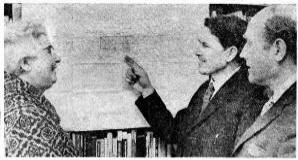
FRIENDS - A SCHOOL WITH A PROUD, PROUD TRADITION
(FROM AN OLD SCRAP BOOK)
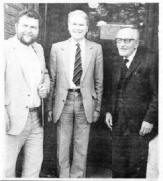
THE in-coming President of Friends' School Old Scholars Association, Mr. Arthur Chapman, recalled the traditions which underlie a `Friends' education' when he addressed guests at Saturday night's centenary dinner.
Mr. Chapman, who is now headmaster of the school, spoke with affection of the school. "It is a school in which family allegiance is strong," he reminded members of the 100-year old Old Scholars' Association. "It was certainly so in my case. My father and mother were both pupils here and as I grew up, they often regaled me with memories of their boarding days in Lisburn."
LINKS
Explaining that his father's links went back through several generations of the Swain and Johnson families, and that his mother was the eldest of the seven McDonagh children, all of whom were educated at Friends, he said: "As I was growing up, my uncles and aunts were finishing their education here and becoming active Old Scholars."
And to illustrate his point further, he pointed out that of the seven members of the McDonagh family, six had married Old Scholars. "That prompted this laconic remark from an American friend," he added: `They say that marriages are made in heaven, but I reckon Friends' School must be an important out-station!' This experience is not unique to the McDonagh family - nor indeed to the pupil body, for numerous are the romances which have blossomed from shared boarding duty in the Nest."
Mr. Chapman himself was a pupil between 1942 and 1944. He spoke fondly of the community spirit which existed at Friends in those days. "Opportunities for social life were limited," he said. "Many of the staff came from England or places far distant from Lisburn, and consequently their entire interests were centred on what was happening at Friends.
GOOD FORTUNE
"Those of us who had the good fortune to be pupils in those days were inspired and challenged by the commitment of teachers such as Donald Smeltzer, Kenneth Clay, Douglas Hill, Arnold Benington, Etta McKee and Florence Halton to name but a few, and the watchful and genial care and discipline administered in such an original way by John M. and Norah Douglas," he recalled. Throughout the hall, Old Scholars nodded in agreement...
"Fine opportunities for development were provided both in the careful teaching in our small classes and also - most importantly - in the widening of horizons by participation in sport, in the Natural History Society, the Globe Club, the choir and the Madrigal Groups and in expeditions." he said.
He expressed his belief that 'extra-curricular' activities appeared to have been the origins of the Association, which this year is celebrating its 100th year.
"As I read accounts of life at the school in those days," he continued, "it is obvious that the education which was offered was not simply `formal book learning' for examinations. Of particular value were the leisure-time pursuits set up by the-then-Headmaster, Joseph Radley, under the all-embracing title of the School Literary and Natural History Association.
DEVELOP INTERESTS
"Outside the classroom, pupils were encouraged to develop personal interests in reading, debating, creative writing and observation of nature and the collection of specimens. In good Quaker tradition, careful minutes were made of all meetings, reports were written and practice gained in committee organisation and the conduct of business. Field trips were an aspect which was greatly enjoyed and added much relief to the restricted nature of school life in those days."
Mr. Chapman said that he often finds himself smiling
wryly as he listens to `the exaggerated claims made for
the new GCSE examination at 16,
which is being laboriously introduced at the present
time'. "I recognise in it precisely the same principles
which were being set out - in non-examination form -100
years ago at this school," he said. "There is the same
emphasis on personal investigation, development of skills,
oral competence, projects and fieldwork, though our
present GSCE task is to quantify and assess, in numerical
form, these somewhat elusive qualities."
Goto Top
Association's objectives
THE Principal of Friends' School, Mr. Arthur Chapman, reminded members of the school's Old Scholars' Association on Saturday evening of their role.
It is clear," he said, "from the original, published objectives, that the Association's purpose was to preserve the sense of camaraderie among those who had been at the school, to foster further interest in extracurricular activities and expeditions and to improve the facilities of the present pupils.
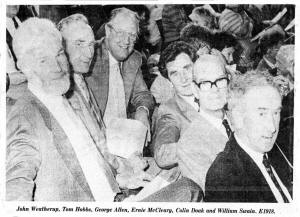
'These high-minded objectives were set out as follows in somewhat quaint and archaic style.
(1) "To bind together all Past Scholars in order to promote a feeling of loyalty towards the School, to which we all owe something and to which many owe much.
(2) "To welcome all signs of true improvement in educational matters, and to endeavour to apply these to the needs of a new generation.
(3) "To maintain and extend an interest in the present scholars by cooperation with the staff, whenever suitable, and by encouragement of all literary, artistic and Natural History pursuits through personal inspection of the work, and by the offering of prizes.
4) "To encourage the continued pursuit of the same studies by those who have left the school."
The reason why all past pupils come back
MEMBERS of Friends' School Old Scholars' Association were asked to consider what brings former pupils back to their school.
The question was posed by Association President, Mr. Arthur Chapman. And he went part of the way towards providing an answer when he said: "I venture to suggest it is not interest in formal education. I suspect that our conversations durihg the afternoon, or at dinner tonight, have not centred on new developments in teaching, or matters connected with syllabus or curriculum.
"Rather, I imagine, they have been concerned with people. `Have you heard anything of old so and so lately? Do you remember the day so and so did such and such a thing?'
"True education is not the acquisition of facts, or even skills. It is not the passing of examinations - it is concerned above all with the development of relationships. Just how badly this element is needed can be seen when we consider broken relationships in home life, in industrial life, in community life and in political life."
To illustrate his point more fully, Mr. Chapman turned the clock back to the early 1940s when he was a Friends' student.
TOTAL EDUCATION
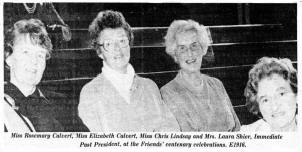
"I often think back to the total educational experience acquired with Arnold Benington in that rather antiquated LQ Chemistry laboratory," he said. "I think of the Scripture text on the blackboard in the firm, well-rounded hand, reminding us of the religious dimension of all our work.
"I think of the sparrow-hawk with the broken wing, fluttering frantically in the fume-cupboard ... of the hockey balls with their white, sticky paint, propped in' the tripods for the following Saturday's match ... and amidst all the chemical experiments which we were carrying out.
"We learned a lot more than `science' in those classes," he said.
And in conclusion he told the members of the
Association: "As Old Scholars of this school, we gave a fine heritage.
We have an obligation to share it for the benefit of those whom we meet
in our daily lives We have a challenge to transmit to the present
generation of scholars, something of these values which have been
expressed at this school for the past one hundred years.'
Goto Top
Nostalgic memories for Old Scholars
"I JUDGE the existence of an Old Scholars' Association an enormous compliment to a school," ' Friends' headmaster, Mr. Arthur Chapman, told members at the FSOSA's centenary dinner on Saturday night.
"For those of us who work here, it is reassuring to know that schoolday experiences are such that many wish to return and savour nostalgic memories of former days," he said.
"The contribution of the Association to the school in practical terms, over the years, is also a proud one. Prizes for sport, craft and essays, and grants to the library, have been made regularly for the past century and each generation of pupils has benefitted in a special way."
OBVIOUS
Mr. Chapman said that one of the most obvious areas of activity involving former pupils was sport. "This is especially true of hockey, where our Old Boys' and Old Girls' teams have promoted development of the skills acquired at school, and have kept the name of Friends' to the fore through their sportsmanship and cup and league successes.
"Our magazine, too, is unique in combining within one cover a survey of events of interest to past and present scholars," he added.
And pointing to the part played by the Association in masterminding and financing forward-looking projects, he noted: `I have always been impressed by the progressive outlook of the school in acquiring a swimming pool in 1898. After all, the first public pool in the borough of Lisburn did not open until 1961.
"Only recently," he added, "did I discover that the initiative for launching the project - and for raising funds - is credited to this Association."
SCHOOL STARTS APPEAL FUND
Ulster Star 16/02/73
Friends' School, Lisburn, shortly to celebrate its 200th. anniversary, will mark the occasion; with a major development scheme.
A target of over £100,000 has been set to get the project under way, but before the public appeal was announced at the school yesterday more than £20,000 had been donated.
The co-operation of people everywhere is being sought. Old Scholars, the business community, and other organisations, are joining in the united effort to boost the Friends' School Bi-Centenary Appeal Fund.
The modernisation scheme provides for the demolition of the older premises which will be superseded b a new three-storey block.
Specialist
This will connect with existing teaching areas and will comprise specialist classrooms, boarding kitchen, and dining room and on the top floor dormitory accommodation.
This scheme, approved by the Ministry of Education, is scheduled to commence this summer.
Originally the appeal total was set at £100,000 but looking beyond this immediate target plans are already being laid for improving the facilities of the Preparatory School, building a pavilion to serve the entire sports area, establishing a resource centre. and develop ing the campus.
At a Press conference Mr. Arthur G. Chapman, the
headmaster. and the representatives of the Governors
outlined the plans.
Goto Top
Charles (87) is an old boy of Friends' School
Ulster Star November 6, 1971
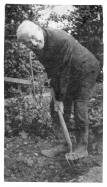 Charles
Swain was working away in the back garden of his home
at Ballynahinch Road.
Charles
Swain was working away in the back garden of his home
at Ballynahinch Road.
Not that there is anything extraordinary about that.
But, at 87 years of age, it was tremendous to see a very fresh Mr. Swain taking such an active interest in the vegetables and flowers which he grows.
Mr. Swain's interest does not rest, alone, in the vegetable patch of his garden. On the contrary.
As he went back over the years he remembered the days when, as a boy, he boarded at Lisburn School, formerly known as the Ulster Provincial School and now known as Friends' School.
That was in 1895, when Joseph Radley was the Headmaster and his wife, Mary, was headmistress.
Of course, Charles Edward Swain has seen a great number of changes. "There are tremendous changes altogether. Both in the buildings and the money spent on the buildings. When I was there the school boarded 80 at the outside. Now there are up to 1,000 day pupils and 100 boarders."
On the subject of the pupils themselves, retired business man Mr. Swain told me: "They are just as mischievous as ever. But, of course, people have changed a lot. We hadn't the same facilities in our day.
CONTACT
Over the years Mr. Swain has kept in close contact with Friends' School and the changes which have taken place. As one of a family of eight who all attended the school, .he was on one of the first committees involved with the Old Scholars' Association.
Since then, there has only been a break of about six years when Friends' did not have a pupil from the Swain family.
When Mr. Swain's own two sons and one daughter left Friends they too joined the Old Scholars' Association. In fact, Billy Swain is chairman of the Old Boys Hockey Club. And now his children are keeping up the line of Swain pupils at Friends.
Obviously, Mr. Swain's granchildren bring him up to date with the famous Quaker school but happy memories were re-called, two years ago, when he went on holiday with two older sisters, aged 90 and 93!
At 87 years old, Charles Swain has a lot to look back on through his association with the Old Scholars.
But, for the more recent members of the 500-strong Friends' Old Scholars' Association, memories are just beginning
With such subcommittees as swimming and magazine, the Old Scholars keep in touch through sessions at the school pool and articles in the annual "book of reminiscences".
MEMORIES
It would be interesting to hear a few of the stories about the school and its teaching profession but, in the meantime, we'll leave the former pupils with their own happy memories.
School relives history
A pageant representing 200 years of life at Friends' School, Lisburn, was presented in the school on Saturday night.
It was in connection with the school's bi-centenary. celebrations and was presented in words, mime, dance and song - a charge from the time when. the question of whether or not to teach- music at this Quaker school was debated with fierce acrimony!
Written' by Sylvia E. Jess and produced by Patricia Gilliland, the pageant was performed by more than 50 pupils Containing as it did Lisburn history, and coming at the end of civic week in the town, it seemed a pity that there was not a showing for the general public.
Among the scenes depicted was the signing of the lease by the Earl of Hertford at Dublin Castle in 1766; the opening of the school in 1774 with John Cough, author of text books on arithmetic and English grammar, as headmaster.
Mr. D. G. Neill, chairman of the governors, presided.

